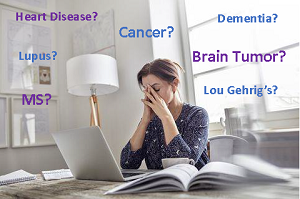Managing Full Health Anxiety Strategies for Coping and Improving Well-Being
 |
| Managing Full Health Anxiety // |
A Comprehensive Approach to Managing Excessive Worry About Health and Improving Quality of Life
R E A D : Eating Habits to Avoid: Top Culprits of High Cholesterol
Health anxiety, also known as hypochondria, is a condition where an individual becomes overly worried about their health and fears that they have or will develop a serious illness. While it is normal to be concerned about one's health, individuals with health anxiety experience excessive and persistent worry about their health, even when there is no clear indication of illness.
Full health anxiety is a particularly intense form of this condition where the individual experiences a constant preoccupation with their health that significantly impacts their daily life. This condition can be debilitating and can lead to social isolation, depression, and a decreased quality of life.
* Symptoms of Full Health Anxiety
* Individuals with full health anxiety experience a range of symptoms related to their preoccupation with their health. These symptoms can include:
* Constantly worrying about their health and the possibility of developing a serious illness.
* Checking their body for signs of illness and seeking reassurance from healthcare providers, friends, and family members.
* Avoiding certain situations, such as going to public places, out of fear of contracting an illness.
* Experiencing physical symptoms such as headaches, stomach upset, or difficulty sleeping due to anxiety related to their health.
* Becoming overly concerned about minor physical symptoms and interpreting them as signs of a serious illness.
* Causes of Full Health Anxiety
The exact cause of full health anxiety is not clear, but it is thought to be a combination of genetic, environmental, and psychological factors. Some individuals may have a family history of anxiety or have experienced a traumatic event, which can increase their likelihood of developing health anxiety.
Environmental factors, such as exposure to illness or disease, can also contribute to the development of health anxiety. Additionally, individuals who are prone to anxiety and worry may be more susceptible to developing full health anxiety.
* Treatment for Full Health Anxiety
Treatment for full health anxiety typically involves a combination of therapy and medication. Cognitive-behavioral therapy (CBT) is a common form of therapy used to treat health anxiety. CBT focuses on changing negative thought patterns and behaviors that contribute to anxiety.
Medications, such as antidepressants and anti-anxiety medications, may also be prescribed to manage symptoms of health anxiety. It is important to work with a healthcare provider to determine the appropriate treatment plan.
Self-care strategies, such as practicing mindfulness, getting regular exercise, and maintaining a healthy diet, can also help manage symptoms of health anxiety.
R E A D : Melanoma: Understanding the Symptoms, Causes, and Treatment Options
* Living with Full Health Anxiety
Living with full health anxiety can be challenging, but there are steps individuals can take to manage their symptoms. It is important to seek treatment and work with a healthcare provider to develop a plan for managing anxiety.
Practicing stress management techniques, such as meditation, deep breathing, or yoga, can help individuals cope with anxiety symptoms. Support from friends and family members can also be helpful in managing health anxiety.
 |
| Managing Full Health Anxiety // Freepik |
In addition to therapy, medication, and self-care strategies, there are other techniques that individuals with full health anxiety can use to manage their symptoms. Some of these include :
* Limiting exposure to health-related information: Individuals with health anxiety may be tempted to constantly check the news or medical websites for information about illnesses or diseases. However, this can actually increase anxiety and worry. It may be helpful to limit exposure to health-related information and to seek out trusted sources of information.
* Challenging negative thoughts: Individuals with health anxiety may have a tendency to catastrophize or jump to conclusions about their health. It can be helpful to challenge these negative thoughts by asking oneself questions such as, "Is there any evidence to support this thought?" or "What's the worst that could happen?"
* Practicing relaxation techniques: Relaxation techniques such as progressive muscle relaxation, guided imagery, or aromatherapy can help reduce anxiety and promote feelings of calm.
* Keeping a journal: Writing down anxious thoughts and feelings in a journal can help individuals gain a better understanding of their triggers and develop strategies for managing them.
It is also important for individuals with full health anxiety to maintain a healthy lifestyle. This includes getting regular exercise, eating a balanced diet, and getting enough sleep. Exercise has been shown to have a positive effect on mental health, reducing anxiety and depression. Eating a healthy diet can help boost the immune system and reduce the risk of developing certain illnesses, which may help alleviate some of the anxiety around health.
Another important aspect of managing full health anxiety is maintaining a support network. Friends and family members can provide emotional support and encouragement, as well as help with practical tasks. Joining a support group can also be helpful, as it allows individuals to connect with others who are experiencing similar challenges.
Finally, it's important for individuals with full health anxiety to be patient with themselves. Managing anxiety is a process, and it may take time to see improvement. Celebrating small victories and progress can help maintain motivation and a positive attitude.
In summary, managing full health anxiety requires a comprehensive approach that includes therapy, medication, self-care strategies, healthy lifestyle choices, support from others, and patience. With a combination of these strategies, individuals can learn to manage their symptoms and improve their overall well-being.
R E A D : The Deadly Stages of Marburg Virus Infection: Understanding the Risks and Symptoms

No comments:
Post a Comment